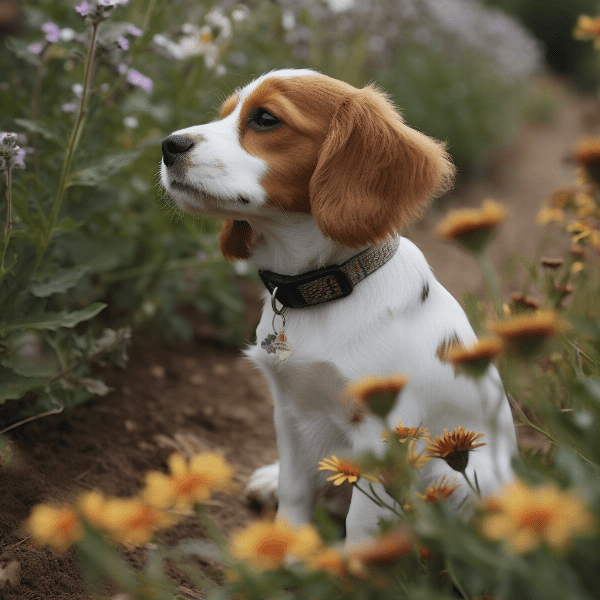Table of Contents
- Understanding Why Puppies Dig
- Providing Adequate Exercise and Stimulation
- Creating a Designated Digging Area
- Using Deterrents to Discourage Digging
- Positive Reinforcement Training Techniques
- Addressing Separation Anxiety
- Monitoring and Supervising Your Puppy
- Avoiding Punishment and Negative Reinforcement
- Seeking Professional Help if Necessary
- Consistency and Patience: Keys to Success
Understanding Why Puppies Dig
Puppies have a natural instinct to dig, which can be caused by a variety of reasons. Understanding why your puppy is digging is an important first step in preventing this behavior.
Instinctual Behaviors
Digging is an instinctual behavior that puppies inherit from their wild ancestors. In the wild, dogs would dig dens to protect themselves and their young from predators, as well as to regulate their body temperature. This behavior is still present in modern dogs, even if they are living in a cozy home instead of the wild.
Boredom and Lack of Exercise
Puppies that are bored or not getting enough exercise may turn to digging as a way to alleviate their pent-up energy. They may also use digging as a way to entertain themselves if they don’t have access to toys or other forms of stimulation.
Temperature Regulation
Puppies may dig to cool down on hot days or warm up on cold days. They may also dig to find a cool, shaded spot to relax in.
Attention Seeking
Puppies may dig as a way to get attention from their owners. If a puppy has learned that digging results in attention, they may continue this behavior to receive more of it.
Anxiety and Stress
Puppies that are feeling anxious or stressed may turn to digging as a way to cope with their emotions. This behavior can be particularly prevalent in dogs with separation anxiety.
Understanding why your puppy is digging can help you determine the best way to prevent this behavior. By addressing the underlying cause, you can help your puppy feel more comfortable and content in their environment.
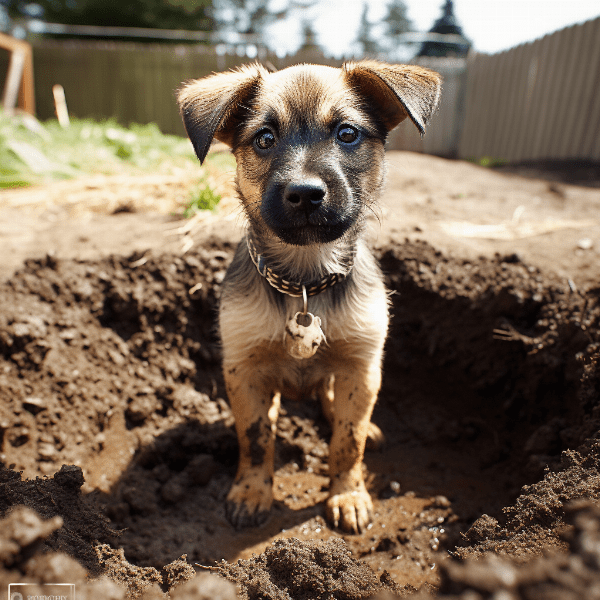
Providing Adequate Exercise and Stimulation
Puppies that don’t receive enough exercise and mental stimulation are more likely to engage in destructive behaviors such as digging. It’s important to provide your puppy with plenty of opportunities to release their energy and challenge their minds.
Physical Exercise
Puppies need plenty of physical exercise to stay healthy and happy. Daily walks, runs, and playtime sessions can help your puppy burn off excess energy and reduce their desire to dig. If your puppy is still very young, it’s important to gradually introduce them to exercise to avoid overexertion.
Mental Stimulation
In addition to physical exercise, puppies also need plenty of mental stimulation. This can include puzzle toys, training sessions, and interactive playtime. Mental stimulation can help tire out your puppy just as much as physical exercise, and it can also help prevent boredom and destructive behaviors.
Socialization
Socialization is also an important part of providing your puppy with adequate exercise and stimulation. Puppies that are exposed to new people, animals, and environments from a young age are more likely to be well-adjusted and confident adults. Socialization can also provide your puppy with new and exciting experiences that can help prevent boredom and destructive behaviors.
By providing your puppy with plenty of exercise, mental stimulation, and socialization, you can help prevent digging and other destructive behaviors. Remember to always supervise your puppy during playtime and avoid overexertion to keep them safe and healthy.
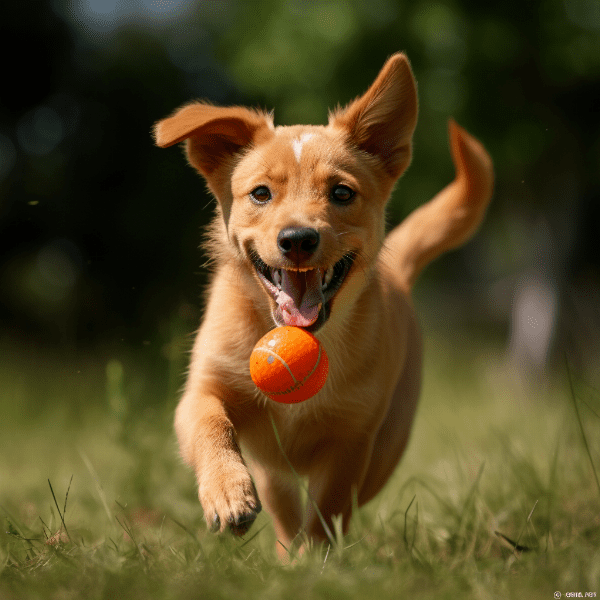
Creating a Designated Digging Area
One way to prevent your puppy from digging in unwanted areas is to create a designated digging area for them. This can help redirect their natural digging instinct to a more appropriate location.
Choosing the Right Location
When creating a designated digging area, it’s important to choose the right location. This area should be easily accessible to your puppy, but not in a location where digging is prohibited, such as near flower beds or under fences. You can also choose an area that is shaded and cool to provide your puppy with a comfortable spot to dig.
Providing the Right Materials
In addition to choosing the right location, it’s also important to provide the right materials for your puppy to dig in. This can include a sandbox, a digging pit filled with sand or dirt, or even a designated section of your yard with loose soil. Providing your puppy with appropriate digging materials can help them understand where it’s okay to dig and where it’s not.
Encouraging Your Puppy to Use the Digging Area
To encourage your puppy to use the designated digging area, you can start by burying treats or toys in the area to pique their interest. You can also use positive reinforcement techniques such as praise and treats to reward your puppy for using the digging area. Over time, your puppy will learn that this is the appropriate spot for digging.
Creating a designated digging area can be a great way to redirect your puppy’s natural digging instinct to a more appropriate location. Remember to provide the right location and materials, and to encourage your puppy to use the area with positive reinforcement techniques.
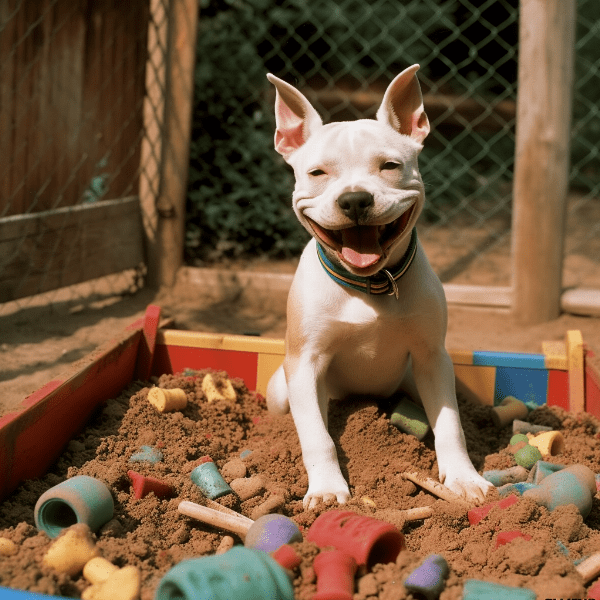
Using Deterrents to Discourage Digging
If your puppy is consistently digging in unwanted areas, it may be necessary to use deterrents to discourage this behavior. Deterrents can help your puppy understand that digging in certain areas is not allowed.
Physical Barriers
One way to use deterrents is to create physical barriers around areas where digging is not allowed. This can include using rocks, fencing, or even chicken wire to prevent your puppy from accessing these areas. Physical barriers can be particularly effective when combined with positive reinforcement training techniques.
Scents and Sounds
Puppies are sensitive to scents and sounds, and there are certain scents and sounds that can discourage digging. Citrus scents, vinegar, and hot pepper flakes are all scents that dogs tend to avoid. You can also use a motion-activated sound machine to emit loud noises when your puppy starts to dig in unwanted areas.
Bitter Sprays
Bitter sprays are a type of dog deterrent that can be used to discourage digging. These sprays are formulated with a bitter taste that most dogs find unpleasant. You can spray this solution on areas where you don’t want your puppy to dig, and the taste will discourage them from continuing this behavior.
It’s important to note that while deterrents can be effective, they should always be used in combination with positive reinforcement training techniques. Punishing your puppy for digging is not effective, and can actually worsen the behavior. By using deterrents in combination with positive reinforcement, you can help your puppy understand where it’s appropriate to dig and where it’s not.
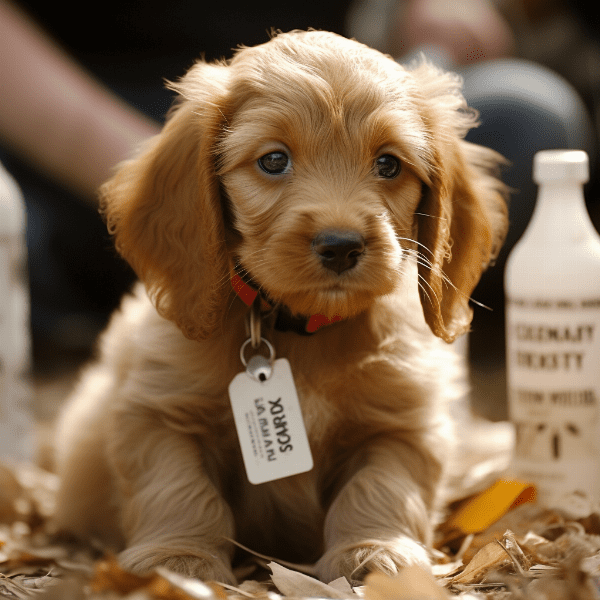
Positive Reinforcement Training Techniques
Positive reinforcement training techniques can be an effective way to prevent digging in puppies. These techniques involve rewarding your puppy for good behavior, rather than punishing them for bad behavior.
Rewarding Good Behavior
To use positive reinforcement to prevent digging, you can start by rewarding your puppy for good behavior. When you catch your puppy not digging in an unwanted area, you can give them praise and a treat. This will help them associate good behavior with positive outcomes.
.
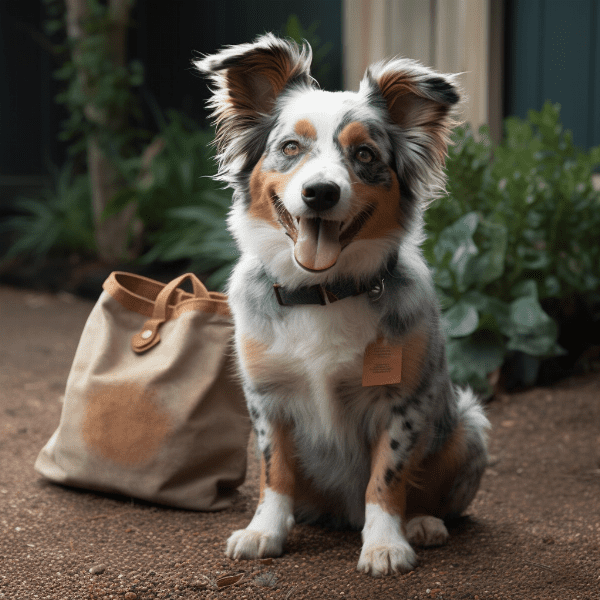
Addressing Separation Anxiety
Separation anxiety is a common issue in puppies, and it can lead to destructive behaviors such as digging. Addressing separation anxiety is an important step in preventing digging in puppies.
Signs of Separation Anxiety
Before you can address separation anxiety, it’s important to recognize the signs. These can include excessive barking or whining, destructive behavior, and digging. Your puppy may also become overly attached to you and follow you around the house.
Gradual Desensitization
One way to address separation anxiety is through gradual desensitization. This involves gradually increasing the amount of time your puppy spends alone, starting with just a few minutes at a time and gradually building up to longer periods. This can help your puppy become more comfortable with being alone, and can help prevent destructive behaviors such as digging.
Crate Training
Crate training can also be an effective way to address separation anxiety. A crate can provide your puppy with a safe and comfortable space where they can relax and feel secure. Start by introducing your puppy to the crate gradually, and make sure to provide plenty of positive reinforcement and treats when they are inside.
.
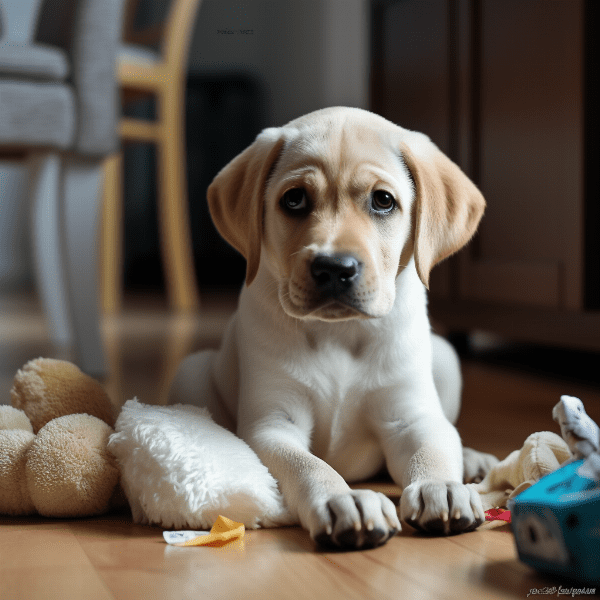
Monitoring and Supervising Your Puppy
Monitoring and supervising your puppy is an important part of preventing digging and other destructive behaviors. By keeping a close eye on your puppy and providing supervision when necessary, you can prevent unwanted digging and keep your puppy safe.
Limiting Access
One way to monitor and supervise your puppy is by limiting their access to areas where digging is not allowed. You can use baby gates or closed doors to prevent your puppy from accessing these areas. This can help prevent unwanted digging and also help keep your puppy safe.
Supervising Playtime
During playtime, it’s important to supervise your puppy to ensure they are not engaging in destructive behaviors such as digging. Keep an eye on your puppy and redirect their behavior if necessary. You can also use positive reinforcement techniques to reward good behavior and prevent unwanted digging.
Avoiding Punishment
When monitoring and supervising your puppy, it’s important to avoid punishment or negative reinforcement. Punishing your puppy for digging can actually worsen the behavior and damage the relationship between you and your puppy. Instead, focus on positive reinforcement techniques and redirecting unwanted behavior.
Consistency and Patience
Monitoring and supervising your puppy requires consistency and patience. It’s important to consistently monitor your puppy and redirect unwanted behavior, and to be patient and understanding as your puppy learns what is expected of them.
By monitoring and supervising your puppy, you can prevent unwanted digging and keep your puppy safe. Remember to limit access to areas where digging is not allowed, supervise playtime, avoid punishment, and be consistent and patient in your approach.
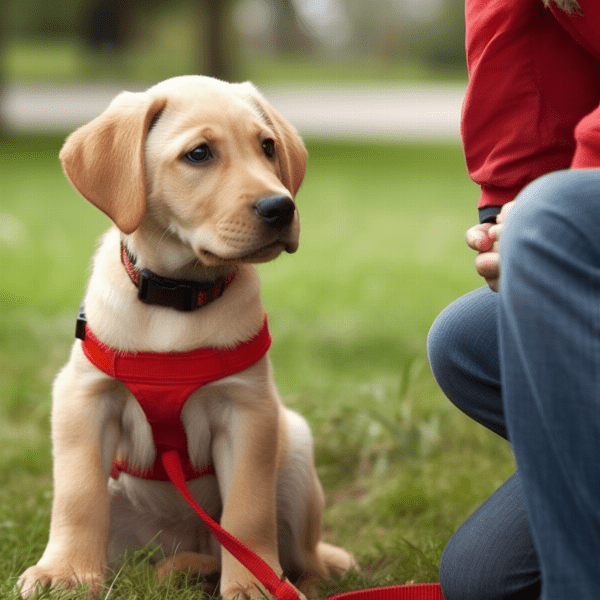
Avoiding Punishment and Negative Reinforcement
Punishing your puppy for digging is not an effective way to prevent this behavior, and can actually worsen the problem. Avoiding punishment and negative reinforcement is an important step in preventing digging in puppies.
Why Punishment is Ineffective
Punishing your puppy for digging can lead to a number of negative consequences. It can damage the relationship between you and your puppy, increase anxiety and stress, and worsen the digging behavior. Punishment can also cause your puppy to become afraid of you or develop other behavior problems.
Positive Reinforcement
Positive reinforcement is a much more effective way to prevent digging in puppies. This involves rewarding good behavior, such as not digging in unwanted areas, with praise and treats. Positive reinforcement can help your puppy learn what is expected of them, and can encourage them to continue good behavior.
Redirecting Behavior
If you catch your Puppy digging in an unwanted area, it’s important to redirect their behavior to a more appropriate location. This can be done by gently leading your puppy to their designated digging area and encouraging them to dig there instead. Once your puppy starts digging in the appropriate area, be sure to praise and reward them.
Seeking Professional Help
By avoiding punishment and negative reinforcement, and using positive reinforcement and redirection techniques instead, you can help prevent digging in puppies. Remember to be patient and consistent in your approach, and seek professional help if necessary.
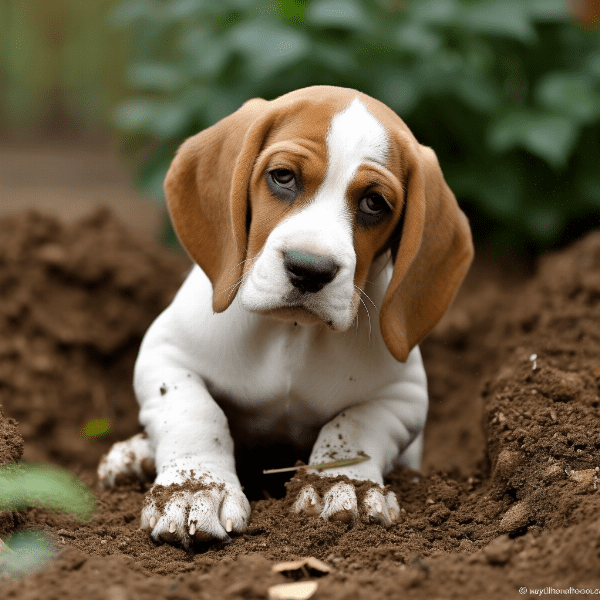
Seeking Professional Help if Necessary
If your puppy’s digging behavior is persistent or severe, it may be necessary to seek professional help. A professional dog trainer or behaviorist can help you develop a customized training plan for your puppy and provide guidance on how to address the problem effectively.
Signs That Professional Help May Be Necessary
There are a few signs that your puppy’s digging behavior may require professional help. These can include persistent digging despite your best efforts to prevent it, destructive behavior that goes beyond digging, and severe anxiety or stress related to separation or other issues.
Benefits of Professional Help
Working with a professional dog trainer or behaviorist can offer a number of benefits. These professionals have experience working with a wide range of dog behaviors and can develop a customized training plan for your puppy based on their specific needs. They can also provide guidance and support throughout the training process, and help you develop strategies for preventing future unwanted behaviors.
Training Techniques
Professional dog trainers and behaviorists may use a variety of training techniques to address digging in puppies. These can include positive reinforcement techniques, gradual desensitization, and crate training. Your trainer or behaviorist may also recommend changes to your puppy’s environment or routine to help prevent digging.
By seeking professional help if necessary, you can get the guidance and support you need to prevent digging in puppies. Remember to look for signs that professional help may be necessary, and to work with a qualified and experienced professional. With time and effort, you can help your puppy learn appropriate behaviors and develop a strong and healthy relationship with them.

Consistency and Patience: Keys to Success
Preventing digging in puppies requires consistency and patience. By following the tips and techniques outlined in this guide, and remaining consistent and patient in your approach, you can help your puppy develop appropriate behaviors and prevent unwanted digging.
The Importance of Consistency
Consistency is key when it comes to preventing digging in puppies. This means consistently providing positive reinforcement for good behavior, redirecting unwanted behavior, and monitoring and supervising your puppy. It’s also important to remain consistent in your routine and environment, as changes can be confusing for your puppy and lead to unwanted behavior.
The Importance of Patience
Patience is also essential when it comes to preventing digging in puppies. Puppies are still learning, and it may take some time for them to fully understand what is expected of them. It’s important to remain patient and understanding, and to avoid becoming frustrated or angry with your puppy. Remember, positive reinforcement is much more effective than punishment or negative reinforcement.
Celebrating Successes
Finally, it’s important to celebrate your puppy’s successes along the way. When your puppy successfully avoids digging in an unwanted area or uses their designated digging area appropriately, be sure to provide plenty of praise and rewards. This can help reinforce good behavior and encourage your puppy to continue it.
By remaining consistent and patient, and celebrating your puppy’s successes, you can help prevent digging in puppies and develop a strong and healthy relationship with your furry friend. Remember to seek professional help if necessary, and to always use positive reinforcement techniques. With time and effort, you and your puppy can enjoy a happy and harmonious life together.
